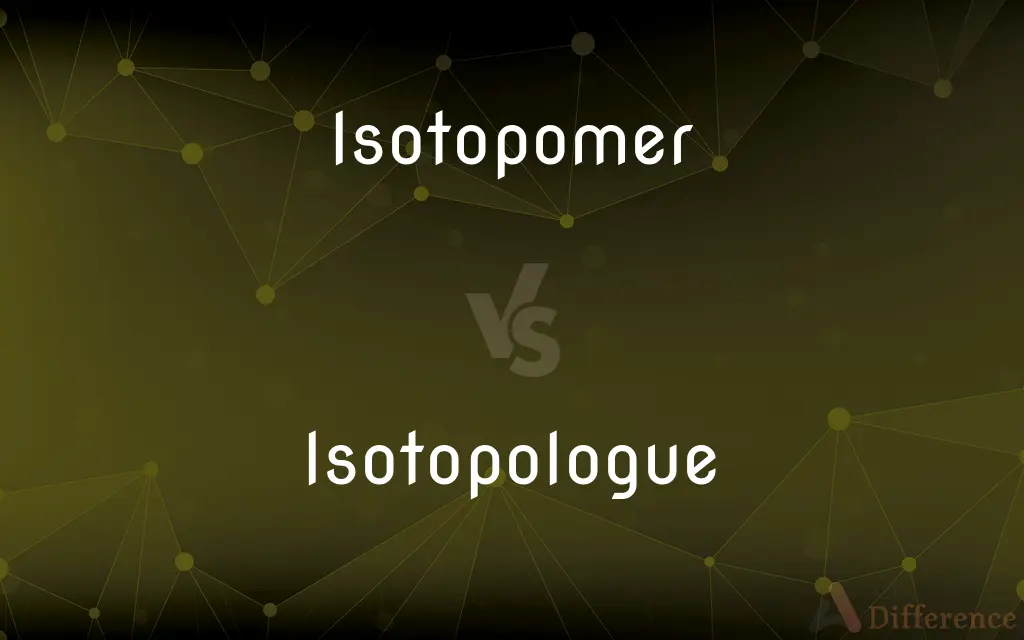Isotopomer vs. Isotopologue — What's the Difference?
By Tayyaba Rehman — Published on December 14, 2023
Isotopomers are molecules differing in isotopic arrangement, while isotopologues are molecules with different isotopic compositions.

Difference Between Isotopomer and Isotopologue
Table of Contents
ADVERTISEMENT
Key Differences
Isotopomer and Isotopologue both describe molecules with isotopic differences. Isotopomers focus on different spatial arrangements of isotopes within a molecule, whereas isotopologues address the overall isotopic composition, regardless of position.
When examining a single molecule with isotopes, the term Isotopomer is used if different arrangements of these isotopes result in distinct molecules. Conversely, Isotopologue is used to group molecules based on shared isotopic compositions, without regard for arrangement.
A classic illustration involves molecules with two isotopic sites. Different isotopes at these sites will yield various isotopologues. However, the specific spatial arrangement of these isotopes will determine the isotopomers.
It's pivotal to recognize that all isotopomers are isotopologues, but not vice versa. This is because while isotopologues categorize by isotopic composition, isotopomers delve deeper, considering isotopic placement.
In scientific discussions, distinguishing between Isotopomer and Isotopologue is essential. While both address isotopic differences, they convey different information about a molecule's isotopic nature, with Isotopomer being more specific.
ADVERTISEMENT
Comparison Chart
Definition
Molecules with different isotopic arrangements
Molecules with different isotopic compositions
Focus
Spatial arrangement of isotopes
Overall isotopic composition
Relationship
A subset of isotopologues
A broader category than isotopomers
Example
Different placements of deuterium in a molecule
Molecules with either deuterium or tritium
Use in Discussion
Specificity in isotopic arrangement
General discussion of isotopic composition
Compare with Definitions
Isotopomer
The result of isotopic permutation in a molecule.
Different isotopomers of a compound can exhibit varied chemical behaviors.
Isotopologue
Useful for discussing overall isotopic differences in molecules.
Analyzing the isotopologues of a sample can provide insights into its isotopic makeup.
Isotopomer
Refers to distinct molecules due to isotopic placement, not composition.
The distinct molecular structure of the Isotopomer provides unique insights into isotopic distribution.
Isotopologue
Molecules with a specific isotopic composition.
Carbon dioxide can exist as various isotopologues, depending on the carbon isotope present.
Isotopomer
Molecules with different spatial arrangements of the same set of isotopes.
By analyzing the Isotopomer, scientists can determine the specific placement of isotopes within a molecule.
Isotopologue
Does not specify the spatial arrangement of isotopes.
The Isotopologue categorizes by isotopic composition, irrespective of isotopic positioning.
Isotopomer
A specific form of isotopologue considering isotopic positioning.
An Isotopomer analysis provides a more detailed view than a simple isotopologue analysis.
Isotopologue
Represents molecules with the same atoms but different isotopes.
Water molecules with oxygen-16 and oxygen-18 are different isotopologues.
Isotopomer
Distinguishes molecules by isotopic arrangement, not just composition.
Two compounds might be isotopologues, but further analysis may reveal they are different isotopomers.
Isotopologue
A broader term that encompasses isotopomers.
Every Isotopomer of a compound is also an isotopologue, but not every isotopologue is an isotopomer.
Isotopomer
(chemistry) any isomer of an organic compound differing only in the position of an isotope
Isotopologue
(chemistry) any of a group of compounds only differing in their isotopic composition; for example normal water and heavy water
Common Curiosities
Can two molecules be isotopologues but not isotopomers?
Yes, they can have the same isotopic composition but different isotopic arrangements.
What's the key difference between an Isotopomer and an Isotopologue?
Isotopomers have different isotopic arrangements, while isotopologues have different isotopic compositions.
When might one discuss isotopologues over isotopomers?
Isotopologues are discussed when addressing overall isotopic composition, without focusing on arrangement.
Why is the distinction between Isotopomer and Isotopologue important?
The distinction conveys different information about a molecule's isotopic nature, with Isotopomer being more specific.
Are isotopomers and isotopologues naturally occurring?
Yes, they occur naturally due to the presence of isotopes in nature.
How is the term Isotopomer used in scientific discussions?
Isotopomer refers to molecules differing in the spatial arrangement of isotopes.
How does isotopic arrangement affect an isotopomer?
The specific spatial placement of isotopes defines an isotopomer within its isotopologue group.
In which fields are these terms commonly used?
They're used in chemistry, especially in isotope studies and molecular research.
Which term, Isotopomer or Isotopologue, offers a broader view of isotopic composition?
Isotopologue offers a broader view, whereas Isotopomer is more specific.
Can a molecule have multiple isotopomers?
Yes, if there are multiple ways to arrange its isotopes.
Does the presence of different isotopologues affect a substance's properties?
Yes, different isotopologues can have slightly different physical or chemical properties.
Are all isotopomers also isotopologues?
Yes, all isotopomers are isotopologues, but not all isotopologues are isotopomers.
Is the study of isotopomers and isotopologues significant in environmental studies?
Yes, they help trace sources and pathways of various compounds in the environment.
Can these terms be used interchangeably?
No, they convey different aspects of isotopic information.
Why are isotopomers significant in metabolic studies?
They allow for detailed tracking of metabolic pathways by observing isotopic arrangement changes.
Share Your Discovery

Previous Comparison
Internal Audit vs. External Audit
Next Comparison
Cardiac Skeletal vs. Smooth MuscleAuthor Spotlight
Written by
Tayyaba RehmanTayyaba Rehman is a distinguished writer, currently serving as a primary contributor to askdifference.com. As a researcher in semantics and etymology, Tayyaba's passion for the complexity of languages and their distinctions has found a perfect home on the platform. Tayyaba delves into the intricacies of language, distinguishing between commonly confused words and phrases, thereby providing clarity for readers worldwide.












































